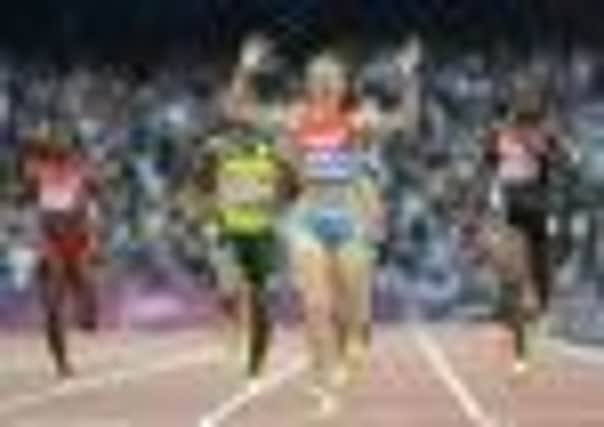London 2012 Olympics: Mariya Savinova upsets the odds in 800m


That was the question many observers were asking, and at least some of the competitors, too, thought that a likely outcome. But in the event, they were confounded, as Russia’s Mariya Savinova ran the most intelligent race to take the gold medal in 1min 56.2sec.
Jelimo, who looked like she had the race under her control with 300m to go, could not even claim a minor medal. Overtaken by Semenya in the home straight, the Kenyan was pipped for bronze in a photo finish by another Russian, Ekaterina Poistogova. Semenya finished relatively strongly to come second in 1:57.23, while a personal best of 1:57.53 gave Poistogova third.
Advertisement
Hide AdAdvertisement
Hide AdCuriously, given the results, Jelimo appeared to judge the pace more shrewdly than Semenya, and at least appeared to put everything into her bid to retain her title. The South African, by contrast, displayed a timidity which belied the formidable presence she should be able to exert by virtue of her superior bulk.
Janeth Busienet, Jelimo’s fellow-Kenyan, led out a fast first lap in 56.4, which looked like it was designed to set the race up for her compatriot. Jelimo followed Busienet through the bell, and took the lead with 250 metres to go.
Semenya, the 2009 world champion and silver medallist two years later, was nowhere – and the rest of the field were not particularly well placed at that point either. But Savinova was biding her time, and after gradually picking up speed to get on terms with the leaders, she burst clear at the top of the home straight, crossing the line several metres clear.
Semenya was at least able to put in that late burst which gave her a medal in her first Olympics, but she still timed that wrong, running out of steam before she reached the line. For an athlete who appeared close to invincible when she burst on to the scene, it was not quite the impact she had hoped for.
Of course, the South African has had a particularly tough time since becoming world champion three years ago. She was subjected to almost a full year of very public scrutiny, including gender tests after widespread suggestions that she was male, or at least possessed male characteristics which would prohibit her from competing in women’s races.
She was eventually cleared to compete in 2010, but suffered a back problem which affected her preparations for the following year’s world championships in Daegu. She still got a silver medal there, however, and now, still only 21, must reflect that two seconds and a first at her three major championships to date is not a bad return. The 2000 champion Maria Mutola has coached Semenya since the end of last year, and the longer that relationship continues, the more Semenya should learn as she attempts to polish her raw talent.